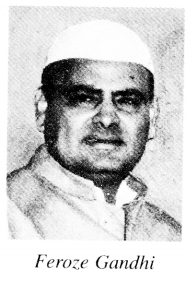The Biography of Famous Personalities of India will tell you about the controversies, the dark sides of a person that you may have never heard of.
Indira Gandhi’s Declaration of Emergency
Declaration of Emergency
Indira Gandhi always gave priority to national interest and when this was involved, she never compromised. So in June 1975, Indira Gandhi was forced to declare a state of internal emergency in India which she thought would be beneficial to the national cause. It was all due to the opposition which was teaming up against Indira because of her growing popularity and these opponents were hurting the sentiments of people and had no thought for the country’s welfare.
At this juncture, Indira had no choice but to declare Emergency. She wanted to defeat the “forces of disintegration”….”Communal passions” that threatened the country. She told people in a broadcast that it was time for “unity and discipline” and she hoped that “people in towns and village will give us their full support so that the country will be strengthened.” During this period, fundamental rights were curtailed and the press was censored as Indira felt that the country needed a “dose of bitter medicine” to recover its health.
But she was wrong and her actions were not completely right. Although she declared emergency for the welfare of nation but it was misused and at lower level, the police did so much wrong to the people that the nation retaliated. Many opposition leaders including Jai Prakash Narain were arrested during this period. People were stunned by the action but due to strictness, their shouts reduced to mere whispers. The nation was in a state of shock as people thought that their freedom was curtailed.

On July 1, 1975, Indira announced the 20-point programme which laid stress on the Govt’s programme of assistance to landless, labourers, small and marginal farmers, artisans, slum- dwellers. Many policies of this programme were very useful for the good of the nation and Indira Gandhi designed this comprehensive programme so as to benefit the middle class and the unemployed; tax evaders, smugglers and law- offenders were subjected to punishment and bonded labour was declared illegal.
The first few days of the launching of this programmed proved very beneficial to people of the nation as corruption decreased, crimes against women declined, communal riots almost became negligible and prices came down. Every person became disciplined because of the fear of the police and the office-goers became punctual. All smugglers were put behind the bars and the general overall economic condition improved.
But the misuse of this programme led to her downfall. People slowly moved away from her and the ruthless treatment of the Govt, decreased her popularity among people and she became friendless, aloof and withdrawn. All her friends who were supportive of her, stamped her as being dictatorial.
Things didn’t work quite the way Indira Gandhi had intended. Done for the good of the people, her actions reversed and she was blamed by the people for being ruthless. Threatened by the people belonging to fanatic factions, she became fearful but she never disclosed her fears. Her confidence and moral strength stood by her throughout her life- during her Vanar Sean days and 1947 partition riots days and also during this period of emergency when some people were believed to have pledged to finish her off.
In this desperate time, she turned to her second son, Sanjay Gandhi for advice and support as her elder son Rajiv Gandhi was not interested in politics but depending on Sanjay was a big mistake as it is believed that Sanjay was behind the excesses done during Emergency.
Although from childhood, Sanjay Gandhi had shown the potential of an active person but his energy got diverted into wrong direction and as he grew up, he developed an aggrassive passion for getting things done. He would get restless, over enthusiastic to achieve his goal and the path which he used to take, was of no consequence. From Jan. 1976, Sanjay launched a 5-point programme tackling the issues of family planning, dowry and casteism but the biggest mistake of Indira Gandhi was to have blind faith in his immature ways.
She thought that she would tame him but she was wrong and sadly she realised, too late, that his destructive energy had become uncontrollable. Sanjay was President of the Youth Congress and taking advantage of his position, he enforced family planning measures so strictly that people were afraid of his high-handedness and this eventually led to Indira Gandhi’s defeat in 1977 elections.













